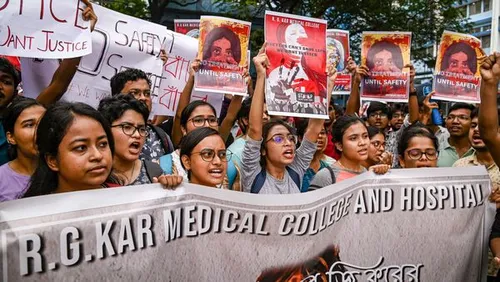Kolkata Rape-Murder Incident
In the wake of a horrifying rape-murder incident in Kolkata, security has been significantly heightened at North Bengal Medical College & Hospital. The tragic event, which shocked the entire state, has led to widespread demands for improved safety measures in public institutions, particularly hospitals, which are often seen as safe havens. This incident has put a spotlight on the need for robust security infrastructure, especially in critical facilities like hospitals where vulnerable populations are served.
Table of Contents
The Kolkata Incident: A Catalyst for Change
The rape and murder of a young woman in a Kolkata hospital sent shockwaves across West Bengal. The brutality of the crime and its occurrence in a place that should have been secure and protected for patients and staff alike ignited widespread outrage. Citizens and civil society groups demanded swift justice and called for immediate steps to prevent such incidents from recurring. The state government, responding to the growing concerns, ordered a thorough review of security arrangements in all major hospitals across the state, with a particular focus on those in Kolkata and North Bengal.
Immediate Security Measures Implemented
In response to these directives, North Bengal Medical College & Hospital, one of the largest healthcare facilities in the region, has swiftly implemented a range of security measures. The hospital administration, working closely with local law enforcement agencies, has put in place several steps aimed at ensuring the safety of patients, staff, and visitors.
- Increased Police Presence: The number of police personnel deployed at the hospital has been significantly increased. Officers are now stationed at key entry and exit points, as well as patrolling the hospital premises around the clock. This heightened police presence is intended to deter potential criminal activities and provide a quick response in case of any incidents.
- CCTV Surveillance: The hospital has expanded its network of CCTV cameras, ensuring comprehensive coverage of all critical areas, including wards, corridors, and entrances. The footage from these cameras is monitored in real-time by a dedicated team, enabling rapid detection and intervention if any suspicious activities are observed.
- Visitor Identification and Registration: To control and monitor the flow of people within the hospital, a strict visitor identification and registration process has been introduced. All visitors are now required to present valid identification and obtain visitor passes before entering patient wards or other sensitive areas. This measure aims to prevent unauthorized access and enhance the security of patients.
- Emergency Response Drills: Hospital staff, including doctors, nurses, and security personnel, are being trained in emergency response procedures. Regular drills are conducted to ensure that everyone knows how to act swiftly and effectively in the event of a security breach or other emergencies.
- Collaboration with Local Police: The hospital administration is maintaining close coordination with local law enforcement agencies. This collaboration includes regular security assessments and the sharing of intelligence to preempt potential threats. The police have also been conducting frequent checks in and around the hospital to ensure that security measures are being strictly followed.
Reactions from the Community
However, some have raised concerns about the potential inconvenience caused by the new security protocols, particularly the visitor identification process, which can lead to delays. “While security is important, it’s also crucial that these measures don’t disrupt the smooth functioning of the hospital. I hope the administration strikes a balance,” commented a resident.
Broader Implications for Healthcare Security
The security overhaul at North Bengal Medical College & Hospital is indicative of a broader shift in how healthcare facilities in the region approach safety and security. The Kolkata incident has served as a stark reminder that even places traditionally seen as safe are not immune to violent crimes. As a result, hospitals are now being viewed not only as centers of healing but also as critical infrastructure requiring robust security measures.
This incident is likely to prompt a re-evaluation of security protocols in hospitals across the state and beyond. Other healthcare facilities in West Bengal are expected to follow suit, with similar measures being implemented to protect patients and staff.
Conclusion
The tragic rape-murder incident in Kolkata has underscored the urgent need for enhanced security in public spaces, including hospitals. North Bengal Medical College & Hospital’s swift response in tightening security measures reflects a growing awareness of the importance of safety in healthcare settings. While the new protocols may cause some inconvenience, they are a necessary step toward ensuring that hospitals remain safe havens for all who seek care. As the hospital moves forward with these changes, it sets an important precedent for the rest of the state’s healthcare institutions.








